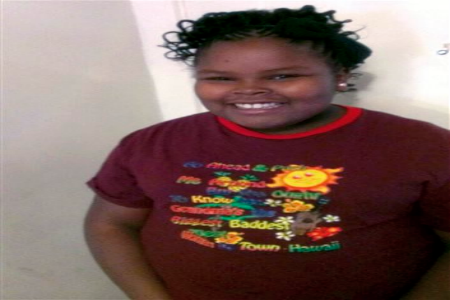
An Oakland family whose 13-year-old daughter has been declared brain dead is hoping to celebrate Christmas in the hospital with her after a judge ordered hospital officials to keep her connected to a breathing machine.
Jahi McMath was declared brain dead after experiencing complications following a tonsillectomy at Children’s Hospital in Oakland.
As her family sat stone-faced in the front row of the courtroom, an Alameda County judge on Monday called for Jahi to be independently examined by Paul Graham Fisher, the chief of child neurology at Stanford University School of Medicine. The judge also ordered the hospital to keep Jahi on a ventilator until Dec. 30, or until further order from the court.
The examination was conducted on Monday and may possibly continue Tuesday.
Hospital staff and Fisher will conduct an electroencephalogram, or EEG, and tests to see if blood is still flowing to Jahi’s brain.
On Dec. 12, doctors concluded the girl was brain dead and since then have wanted to remove her from life support. Jahi’s family wants to keep her hooked up to a respirator and eventually have her moved to another facility.
The family said it believes she is still alive and that the hospital should not remove her from the ventilator without its permission.
“It’s wrong for someone who made mistakes on your child to just call the coroner … and not respect the family’s feeling or rights,” Sandra Chatman, Jahi’s grandmother and a registered nurse, said in the hallway outside the courtroom.
“I know Jahi suffered, and it tears me up.”
The family’s attorney also asked Judge Evelio Grillo to allow a third evaluation by Paul Byrne, a pediatric professor at the University of Toledo. The hospital’s attorney objected to Byrne, saying he is not a pediatric neurologist.
The judge is expected to consider the request to use Byrne, and another hearing was scheduled for Tuesday morning.
Byrne is the co-editor of the 2001 book “Beyond Brain Death,” which presents a variety of arguments against using brain-based criteria for declaring a person dead.
In a phone interview, Byrne said he could not comment in detail because he had not seen any of Jahi’s medical records. But the fact that her ventilator is still functioning properly is a sign that she is alive, he said.
“The ventilator won’t work on a corpse,” he said. “In a corpse, the ventilator pushes the air in, but it won’t come out. Just the living person pushes the air out.”
Jahi’s family says the girl bled profusely after a tonsillectomy and then went into cardiac arrest before being declared brain dead.
Outside the courtroom, Dr. David Durand, chief of pediatrics at Children’s, said staff have the “deepest sympathy” for the family, but that Jahi is brain dead.
“The ventilator cannot reverse the brain death that has occurred and it would be wrong to give false hope that Jahi will ever come back to life,” he said.
Durand said Jahi’s surgery was “very complex,” not simply a tonsillectomy.
“It was much more complicated than a tonsillectomy,” Durand said. He refused to elaborate, citing health care privacy laws.
Arthur L. Caplan, who leads the Division of Medical Ethics at NYU Langone Medical Center and is not involved in Jahi’s case, told The Associated Press that once brain death has been declared, a hospital is under no obligation to keep a patient on a ventilator.
“Brain death is death,” he said, adding, “They don’t need permission from the family to take her off, but because the little girl died unexpectedly and so tragically, they’re trying to soften the blow and let the family adjust to the reality.”
Often families confuse brain death with a coma or a permanent vegetative state, Caplan said.
“A coma is like a television that has a picture with a lot of interference,” he said. “There’s brain activity, but something’s not right. A permanent vegetative state is when the screen is all snow. Brain death is when the set is unplugged. There is nothing on the screen.”
Keeping Jahi on a ventilator is also likely to cost thousands of dollars a day, Caplan said, and because she has been declared brain dead, is unlikely to be covered by health insurance.
Earlier Monday, Christopher Dolan, the family’s attorney, vowed to keep Jahi hooked to the ventilator through Christmas. He said he would file an appeal if the judge orders her removed from the machine on Tuesday.
“I am confident she’ll live through Christmas,” a visibly weary Dolan said after the hearing. He said he is working the case for free after the family reached out for help a week earlier.
Given the very public battle over Jahi’s treatment, the judge pleaded with attorneys on both sides to continue speaking with each other and the family to help prepare for his eventual final order.
“This is a very, very charged case. The stakes are very high because there’s a young girl involved,” Grillo said.